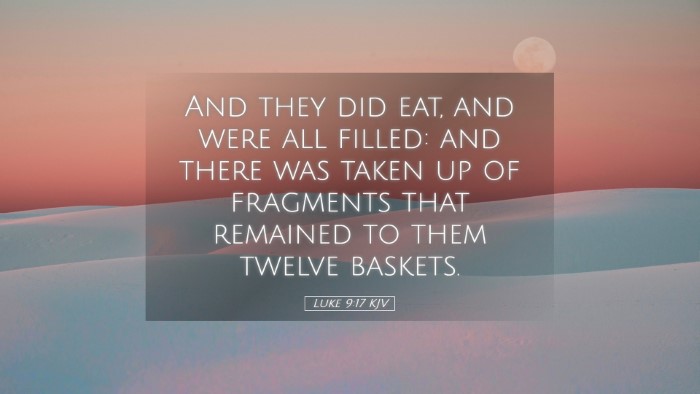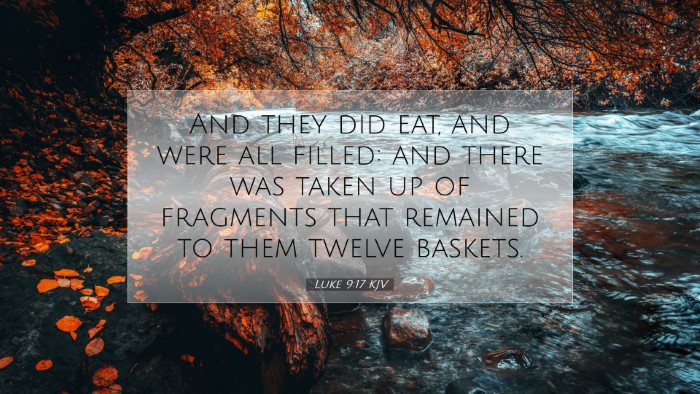Commentary on Luke 9:17
Bible Verse: “And they did eat, and were all filled: and there was taken up of fragments that remained to them twelve baskets.”
Introduction
This passage occurs in the context of the miraculous feeding of the five thousand, a significant event in the ministry of Jesus that reveals His divine provision and care for His followers. Public domain commentaries provide insights that are invaluable for understanding the layers of meaning in this text.
Exegesis of Luke 9:17
Matthew Henry emphasizes the importance of the miraculous works of Jesus, noting that this miracle illustrates both His compassion and His ability to provide abundantly. He writes about how the disciples, upon distributing the food, witnessed the transformation of what seemed like insufficient resources into a feast for thousands. Henry's observation highlights the theological significance of divine provision in the face of human limitations.
Albert Barnes provides a detailed analysis of the logistics of the miracle. He notes that it was not only the act of feeding but the method by which Jesus accomplished this was vital, affirming His authority and divine power. He reflects on the twelve baskets of leftovers as a sign of God's abundant grace, indicating that God's provision exceeds our needs. Barnes posits that the identity of the twelve baskets correlates to the twelve tribes of Israel, symbolizing God's sufficiency for His covenant people.
Adam Clarke similarly underscores the significance of the leftover fragments, interpreting them as a sign of God's ability to care for all. Clarke also brings attention to the symbolism in the act of eating and being "filled," linking it to spiritual nourishment. He explores the implications of this miracle for the church, suggesting it serves as a model demonstrating how Jesus satisfies both physical and spiritual hunger.
Theological Implications
- Divine Provision: The miracle encapsulates a vital theme in the Gospels—the notion that God provides for the needs of His people. This feeding signifies not just physical sustenance but also reflects the spiritual nourishment that Jesus offers.
- Abundance of Grace: The overabundance of leftovers speaks to the generous nature of God. It reiterates that His grace is sufficient, and highlights that even in our perceived scarcity, God’s provision can exceed our expectations.
- Community and Gathering: This event occurred in the context of a gathered community, emphasizing the importance of fellowship among believers. It teaches that coming together often leads to divine encounters and experiences of miraculous provision.
Practical Applications
For pastors and theologians, this text encourages an approach towards ministry that trusts in God's capacity to provide. It can cultivate a spirit of gratitude and reliance on divine sufficiency among church communities.
Students of the Bible may apply this lesson in various life circumstances by recognizing that even when resources appear to be scant, faith in Christ opens avenues for miracles. This is an invitation to actively engage with need in faith.
Moreover, the commentary invites further reflection on issues of hunger and need in contemporary society, calling believers to action in social justice and compassionate outreach, following the example laid out by Christ.
Conclusion
The miracle of the feeding of the five thousand, as recorded in Luke 9:17, serves a dual purpose—it is both a demonstration of Jesus’ divine authority over creation and a profound illustration of His grace and provision. As seen in the insights from Matthew Henry, Albert Barnes, and Adam Clarke, this verse connects deeply with themes of abundance, community, and the nature of divine care.
In understanding and sharing this Scripture, we are reminded of our complete reliance on God's provision—whether for our physical needs or spiritual sustenance. Let this passage encourage faith-filled living and outreach in ways that reflect the heart of Jesus, the bread of life.


